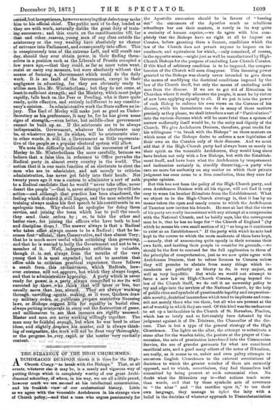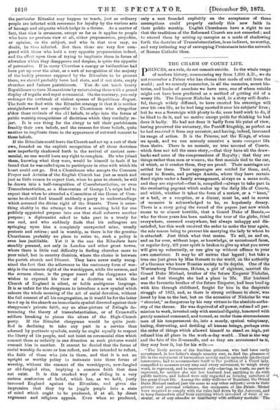`,7:, 20110All ;
.14E1AP, gFil,HE HIGH CHURCHMEN. A Romputomi AFSIS9N thinks it is time for the High- 11. Church- Clergyr"le, bretk with the Bishops." That, at, all events, whatever else 4 may be, is a manly and vigorous way of putting thinge 'Which is completely worthy of , our great Archi- diaconal schoolboy, Of whom, in his way, we are all a little proud, , however mob tve,are. amazed at his intellectual eccentricities, and his of our ecclesiastical history. Little as we noe With -the venerable Archdeacon in his strange view of Church •policy,—and that a man who argues passionately for the particular Ritualist may happen to teach, just as ordinary people are infected with reverence for loyalty by the various acts of homage and etiquette which hedge in a throne. As a matter of fact, that view is erroneous, except so far as it applies to- people who have no previous view at all, either prepossession, prejudice, or opinion, on the subject, and who in that case may, no doubt, be thus infected. But then these are very few com- pared with those who bold a very opposite prepossession indeed, and the effect upon them of trying to implicate them in forms of adoration which they disapprove and despise, is quite the opposite of persuasive. If in many Churches a canopy or balclacehino had been put up over the altar, as a sort of recognition of the majesty of the bodily presence supposed by the Ritualists to be present there, we should probably have had riots, and if not riots, empty churches and furious parishioners. Yon de not teach hearty Republicans to turn Monarchists by entertaining them with a grand display of regalia and royal ceremonial. On the Contrary, you only endanger the outbreak of violent spasms of Republican disgust. The fault we find with the Ritualist strategy is that it is neither straightforward nor respectful to Churchmen who altogether abhor these revivals of the oil beliefs, to edge into the forms of public worship recognitions of doctrines which they cordially re- ject. It is one thing for the clergy to tell their parishioners frankly their own beliefs, and the mesons for those beliefs, quite another to implicate them in the appearance of outward consent to those beliefs. If the Ritualiste could leave the Church anelset up a sect of their own, founded on the explicit recognition of all those doctrines now imperfectly shadowed forth in the revival of ancient cere- monial, no one would have any right to complain. He who joined them, knowing what they were, would be himself in fault if he found that he was called upon to participate in rites 'withwhich his heart could not go. But a Churchman who accepts the Common Prayer and Articles of the English Church has just as much and just as little reason to expect that, when he goes to church, be will be drawn into a half-recognition of Consubetantiation,- or even Transubstantiation, as a Hanoverian of George L's reign had to expect that when he attended a Committee of the House of Com- mons be should find himself suddenly a party to understandings which assumed the divine right of the Stuarts. There is some- thing shabby in the attempt to divert a meeting held for one publicly appointed purpose into one that shall subserve another purpose ; a diplomatist asked to take part in a treaty for one end, and who suddenly finds that his colleagues are springing upon him a completely unexpected mine, usually protests and retires ; and in worship, as there is for the genuine Churchman probably no place to retire to, such a policy is even leas justifiable. Yet it is the one the Rilnalists have steadily pursued, not only in London and other great towns, where there is little real difficulty in finding churches more to your mind, but in country districts, where the choice is between the parish church and Dissent. They have never really recog- nised the fact that the adherence to the customary form of wor- ship is the common right of the worshippers, while the sermon, and the sermon alone, is the proper resort of the clergyman who wishes to expound his view of a doctrine on which the Church of England is silent, or holds ambiguous language. It is as unfair for the clergyman to introduce a new symbol which colours the whole meaning of the act of social devotion, without the full consent of all his congregation, as it would be for the latter to set up in the church an iconoclastic symbol directed against their clergyman's private faith, say an altar-picture of Ziingle de- nouncing the theory of transubstantiation, or of Cromwell's soldiers breaking to pieces the altars of the High-Church party. If the Ritualist clergyman would be quite justi- fied in declining to take any part in a service thus adorned by puritanic symbols, surely he ought equally to respect the liberty of his people, and not insist on ceremonial rites which commit them as unfairly in one direction as such pictures would commit him in another. It cannot be denied that the forms of eocial worship do more or less reflect, and are intended to reflect, the faith of those who join in them, and that it is not an upright or worthy policy to insinuate into those forms of worship, without the consent of the worshippers, new-fangled or old-fangled rites, implying a common faith that does not exist. It is this crooked way of sliding in a very serious confession of belief, which has, as we hold, justly incensed England against the Ritualists, and given the impression that they try to juggle people into a state of mind which might to be produced, if at all, by direct argument and religious appeals. Even when so produced, only a sect founded explicitly on the acceptance of these assumptions could' properly embody this new faith in their public worship. English Churchmen have a right to see that the traditions of the Reformed Church are not exceeded ; and to exceed them by setting up canopies as a mode of shadowing forth the doctrine of Transubstantiation, is an indirect, unworthy, and very irritating way of entrapping Protestants into the network of Roman Catholic ideas.











































 Previous page
Previous page